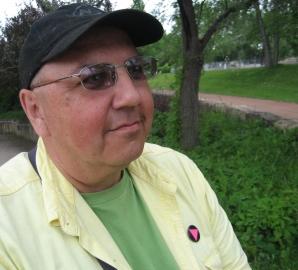As National Aboriginal Day is celebrated across Canada, Winnipeg’s Albert McLeod has many reasons to be proud. But McLeod’s two-spirited brothers and sisters also have many reasons to be proud of him.
Last weekend, McLeod bravely came out to the whole country. He was one of about a dozen people chosen to participate in the first sharing circle of the Truth and Reconciliation hearings into residential school abuse. Under a big white tent, with hundreds of residential school survivors and the national media watching, McLeod took the microphone from the Grand Chief of the Assembly of First Nations, Shawn Atleo, and said, “I’m a gay man and I’ve always been gay.”
It was a remarkable and unexpected announcement, considering that some Aboriginal people still believe that residential schools — and the sexual abuse inflicted by many of its priests — caused students to be gay. Native residential schools were established by the Canadian government and various churches in the late 19th century as a way of stripping kids of their Aboriginal identities.
For just over 100 years, the schools were sadly successful at decimating families and eliminating Aboriginal languages. The Truth and Reconciliation hearings, which began last Wednesday in Winnipeg, are meant to be a high-profile platform for Aboriginal people to discuss the nightmares of the past and imagine a better future.
McLeod, the volunteer leader since 1986 of a group called Two-Spirited People of Manitoba, was surprised to be invited to the high-profile sharing circle with Chuck Strahl, Canada’s minister of indian affairs, and Justice Murray Sinclair, the head of the Truth and Reconciliation commission. He was equally surprised when the Grand Chief himself handed McLeod the microphone to be the second speaker.
“I could tell by peoples’ body language that they didn’t have the ability to acknowledge me,” McLeod said later. Still, he admits it was a real coup for him to get the platform — probably as a result of writing a letter to the commission and telling them why two-spirited people should be included in the Aboriginal liberation movement.
“In order to advance human rights you have to value your identity,” said McLeod. He identified himself to the crowd as a man who grew up in “one of the most racist, homophobic communities our Western democracy could create,” The Pas, Manitoba. He first realized he was gay at age 11 and attempted suicide at 17.
“I chose death to embrace me, to take me out of my misery,” said McLeod, who is now 54. Fortunately, he didn’t kill himself, but many of his friends did. “The end result of residential schools for many two-spirit people is violence, death, murder or suicide.”
There’s hope for two-spirited residential school survivors, though, in the form of
The trio of researchers made a host of recommendations, including better transition and housing services for mobile two-spirited people, gay group homes and foster care services, gay or trans representation on Aboriginal councils and even a gay jail.
When an audience member asked why a gay jail is necessary, Passante responded, “Jails are currently built for men or women. People in between have no place. No one wants to go to jail, but you really don’t want to go to jail if you’re a trans person. It’s not safe at all.”
McLeod said he would send the report to the Assembly of First Nations. He also said he would ask the AFN to help fund the 22nd Annual International Two Spirited Gathering, which takes place this September in Beausejour, Manitoba.
Looking back on his sharing circle revelation, McLeod said that one of the key reasons he spoke out was because “the only time I’ve ever heard a First Nations leader speak positively about gay, lesbian and trans issues” was Clyde Bellcourt, co-founder of the American Indian Movement. Two-spirited people, take note: the Canadian Aboriginal movement has Albert McLeod.

 Why you can trust Xtra
Why you can trust Xtra


